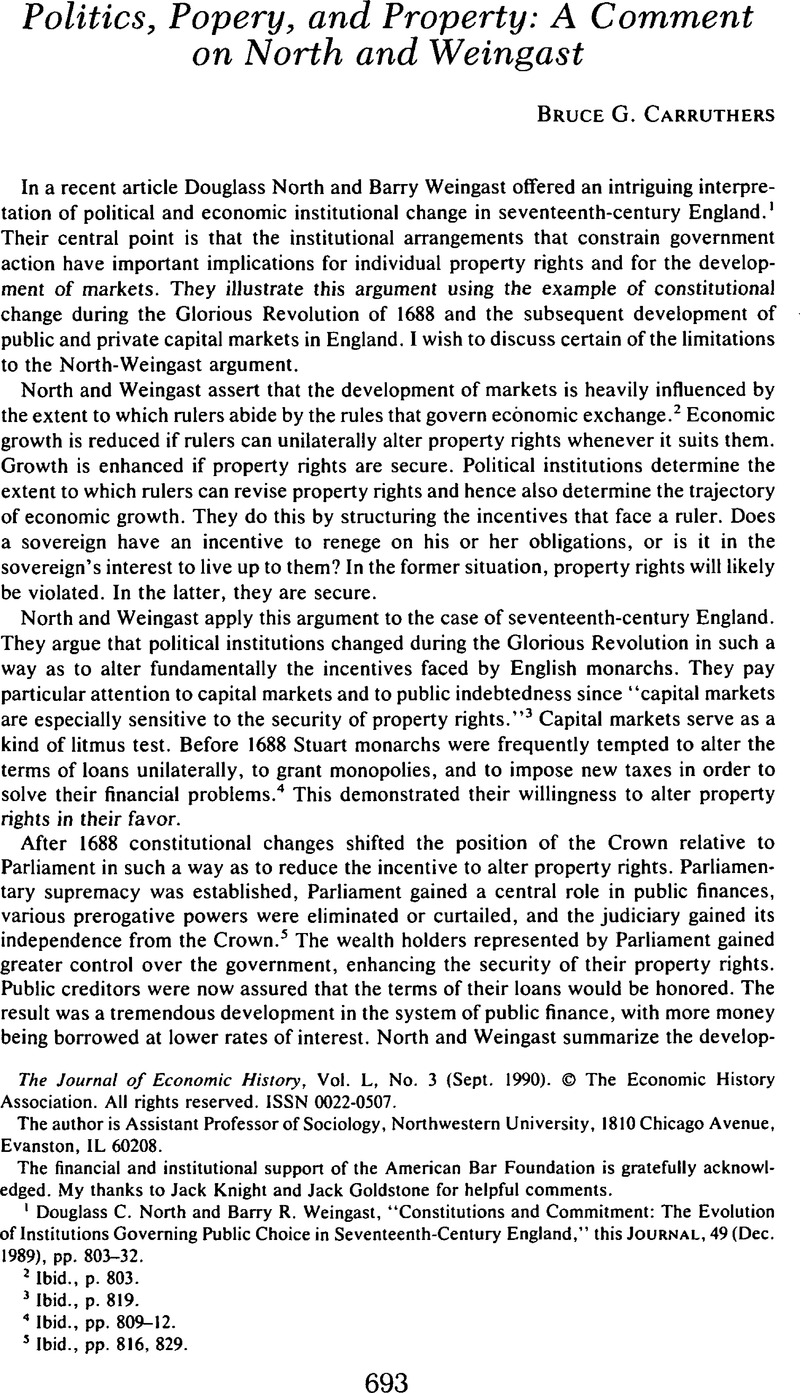Published online by Cambridge University Press: 03 March 2009

1 North, Douglass C. and Weingast, Barry R., “Constitutions and Commitment: The Evolutionof Institutions Governing Public Choice in Seventeenth-Century England,” this JOURNAL, 49 (12 1989), pp. 803–32.Google Scholar
2 Ibid., p. 803.
3 Ibid., p. 819.
4 Ibid., pp. 809–12.
5 Ibid., pp. 816, 829.
6 See Shaw, W. A., ed., Calender of Treasury Books (London, 1908), vol. 3, p. xlviii.Google Scholar
7 The connection of the Stop with the Third Dutch War is consistent with North and Weingast's point that wars raise the discount rate of rulers and make repudiations of sovereign debt more likely.Google Scholar
8 Horsefield, J. Keith, “The ‘Stop of the Exchequer’ Revisited,” Economic History Review, 35 (11 1982), p. 514.CrossRefGoogle Scholar
9 The terms of the letters patent allowed the goldsmith-bankers the option of assigning a portion of the interest payments they received directly to their own creditors, most of whom were former depositors.Google Scholar
10 Horsefield, “The ‘Stop of the Exchequer,’” p. 517.Google Scholar
11 Clay, C. G. A., Economic Expansion and Social Change: England 1500–1700 (Cambridge, 1984), vol. 2, p. 277.Google Scholar
12 Holdsworth, Sir William, A History of English Law (3rd edn., London, 1944), vol. 9, pp. 8–15, 22–23.Google Scholar
13 The Court of Exchequer had jurisdiction over cases involving Crown revenue. A monstrans de droit was a fourteenth-century offshoot of the petition of right. For some situations it provided an alternative remedy against the Crown. See Holdsworth, A History, p. 25.Google Scholar
14 Ibid., p. 33.
15 Sachse, William L., Lord Somers: A Political Portrait (Manchester, 1975), p. 75.Google Scholar
16 Horsefield, “The ‘Stop of the xchequer,’” pp. 519–20.Google Scholar
17 See the Historical Manuscripts Commission, Manuscripts of the House of Lords, new series (London, 1905), vol. 3, pp. 407–9.Google Scholar
18 North and Weingast, “Constitutions and ommitment,” p. 820.Google Scholar
19 Burton, I. F., Riley, P. W. J., and Rowlands, E., Political Parties in the Reigns of William III and Anne (Bulletin of the Institute of Historical Research. Special Supplement No. 7, London, 1968), pp. 1–3Google Scholar; Johnson, Richard R., “Politics Redefined: An Assessment of Recent Writings on the Late Stuart Period of English History, 1660 to 1714,” William and Mary Quarterly, 35 (10 1978), pp. 705–7.CrossRefGoogle Scholar
20 Jones, J. R., The First Whigs: The Politics of the Exclusion Crisis, 1678–1683 (London, 1961), pp. 2, 4, 214.Google Scholar
21 Speck, W. A., Reluctant Revolutionaries: Englishmen and the Revolution of 1688 (Oxford, 1988), pp. 66, 128.Google Scholar
22 Horwitz, Henry, Parliament, Policy and Politics in the Reign of William III (Newark, 1977), pp. 217, 316–17.Google Scholar
23 Holmes, Geoffrey, British Politics in the Age ofAnne (London, 1967), p. 63Google Scholar; Speck, W. A., Tory and Whig: The Struggle in the Constituencies, 1701–1715 (London, 1970), pp. 1, 22.Google Scholar
24 Horwitz, Parliament, Policy and Politics, pp. 130–31;Google ScholarRubini, Dennis, “Politics and the battle for the Banks, 1688–1697,” English Historical Review, 337 (10 1970), p. 694.Google Scholar
25 Holmes, Geoffrey, British Politics, p. 27;Google ScholarHill, B. W., The Growth of Parliamentary Parties, 1689–1742 (Hamden, 1976), p. 69.Google Scholar
26 SirClapham, John, The Bank of England (Cambridge, 1945), vol. 1, pp. 74–75Google Scholar; Hill, B. W., “The Change of Government and the ‘Loss of the City,’ 1710–1711,” Economic History Review, 24 (08 1971), p. 395.CrossRefGoogle Scholar
27 Dickson, P. G. M., The Financial Revolution in England (London, 1967), p. 65.Google Scholar
28 Brewer, John, The Sinews of Power: War, Money and the English State, 1688–1783 (New York, 1989), p. 120Google Scholar; Sperling, John G., The South Sea Company (Boston, 1962), pp. 7, 14.Google Scholar
295 Horwitz, Henry, “The East India Trade, The Politicians, and the Constitution; 1689–1702,” Journal of British Studies, 17 (Spring 1978), p. 1.CrossRefGoogle Scholar
30 Ibid., pp. 10–11.
31 Horwitz, Henry, Parliament, Policy and Politics, pp. 232–33;Google ScholarJones, D. W., War and Economy in the Age of William 111 and Marlborough (Oxford, 1988), pp. 221, 301.Google Scholar
32 North and Weingast, “Constitutions and Commitment,” p. 804.Google Scholar
33 Miller, John, Popery and Politics in England, 1660–1688 (Cambridge, 1973), pp. 197, 202, 250;CrossRefGoogle ScholarSpeck, Reluctant Revolutionaries, p. 128.Google Scholar
34 Speck, Reluctant Revolutionaries, pp. 233, 235.Google Scholar
35 Giuseppi, J. A., “Sephardi Jews and the early years of The Bank of England” Transactions ofthe jewisjh Historical Society of England, 19, (1955–1959), pp. 53–54Google Scholar; Carter, A. C., “The Huguenot Contribution to the Early Years of the Funded Debt, 1694–1714” Proceedings of the Huguenot society of London, 19 (1955), p. 22.Google Scholar
36 Lee, Maurice Jr, The Cabal (Urbana, 1965), p. 159.Google Scholar
37 North and Weingast, “Constitutions and Commitments,” p. 805.Google Scholar